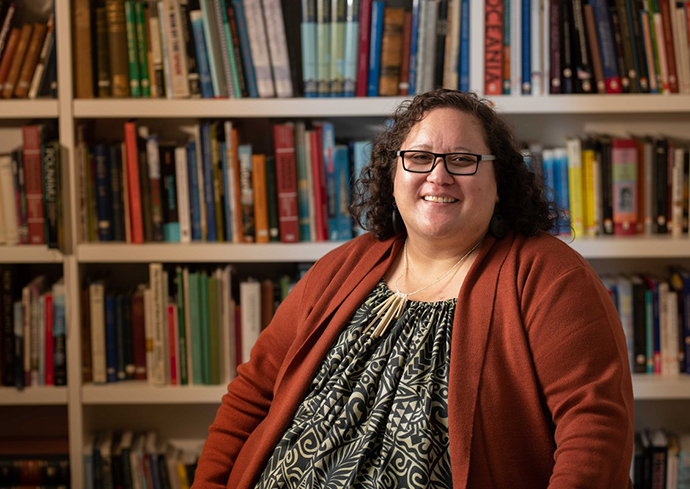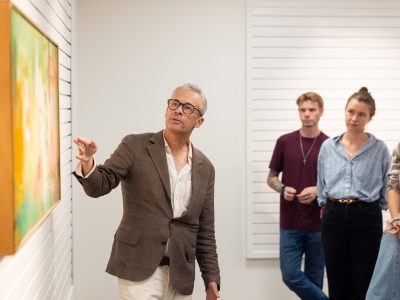Indigenous Philosophies Can Create Global Change and More Just Futures
This spring, the Syracuse University Humanities Center welcomes a visit by renowned Māori scholar, moral and political philosopher, Krushil Watene. She is a member of the Māori tribal communities of Ngāti Manu, Te Hikutu, Ngāti Whātua Ōrākei and the Pacific Island of Tonga (Hunga, Vava’u). Watene is the Peter Kraus Associate Professor of Philosophy, and associate professor, faculty of arts, at the University of Auckland/Waipapa Taumata Rau, Aotearoa New Zealand. She will be in residence on campus as the 2024 Jeanette K. Watson Distinguished Visiting Professor in the Humanities.
The center provides major support for a faculty member to organize the Watson Professorship. This year, two College of Arts and Sciences (A&S) faculty members are partnering to host Professor Watene, each bringing distinct expertise and leadership capabilities: Professor Verena Erlenbusch-Anderson, associate professor of philosophy, and Mariaelena Huambachano, assistant professor of Native American and Indigenous studies and environmental justice.
Watene’s scholarship draws on Indigenous philosophies to address climate change. For example, she suggests that people can transform how they think about the environment by looking through the lens of “kaitiakitanga,” the Māori concept of stewardship of the sky, sea and land. This mindset, rooted in a deep connection to history, ancestors and the environment, offers valuable wisdom for informing policy and law and helping cultivate a healthier, more reciprocal relationship between humans and the environment.
Indigenous Philosophy, Global Change and Just Futures, the title of Watene’s residency, will address fundamental questions in ethics, politics and Indigenous philosophy. In particular, Watene will explore various philosophical traditions, emphasizing the essential contribution of local communities to achieve global change. Watene’s areas of expertise include mainstream theories of well-being, development and justice, intergenerational justice and Māori philosophy.
“We are honored to welcome Krushil Watene as the Watson Professor this spring,” says Vivian May, director of the Humanities Center and professor of women’s and gender studies, both in the College of Arts and Sciences. “At a time when we are confronting environmental crises on multiple fronts, we need solutions to climate change that draw from diverse knowledges and experiences, and that foreground the humanities’ important role in our collective future. Watene brings a depth of expertise grounded in Māori philosophy and in her own community engagement and climate justice work in Aotearoa New Zealand.”
Professors Erlenbusch-Anderson and Huambachano collaborated to host Watene for the Watson Professorship because of her important contributions to contemporary Western philosophy and scholarship on intergenerational justice. They agree that her body of work provides crucial guidance in finding solutions to environmental degradation and climate change by robustly embracing Indigenous philosophies that consider obligations to future generations, as well as ancestors.
“Professor Watene’s work exemplifies the social and political urgency of philosophy and shows how transformative philosophy can be when it is grounded in a commitment to justice, connected to local Indigenous communities and in dialogue with other disciplines,” says Erlenbusch-Anderson. “Her work provides a striking contribution to contemporary philosophy by foregrounding Indigenous values as an innovative way to ensure a sustainable future.”
“From a local to a global scale, Professor Watene’s research highlights the valuable role that Indigenous epistemologies, ontologies and ethics play in improving planetary health,” says Huambachano. “Her work urges humanity to listen to and learn from Indigenous philosophies about our responsibilities to build resilient communities in which both human and non-human entities, like rivers, forests and the Earth itself, can thrive in unison, paving the way for present and future generations to live in flourishing communities.”
Watene will headline six public scholarly events. These will draw on her research on Indigenous conceptions of well-being and sustainable development, including insights from Māori tribal communities and how these are influencing policy and law.
Her two-week residency includes the following opportunities to engage:
Rethinking Sustainable Futures: Indigenous Conceptions of Well-Being, Development, and Justice
Wednesday, March 20, 4-5:30 p.m.
Watene discusses how Indigenous philosophies are inherently good for equitable social, economic, environmental and cultural development. Also, she shares insights on sustainable development, achievable through the proven methods of Māori communities.
Indigenous Philosophy: Local Insights for Global Challenges
Thursday, March 21, 4-5:30 p.m.
Faculty working in the fields of Native American and Indigenous Studies and Philosophy join Watene to discuss reconciliation, transitional and Indigenous justice.
Indigenous Philosophy and Environmental Justice: Concepts, Methods, Applications
Friday, March 22, 10 a.m.–2 p.m. (Space is limited, registration required.)
A three-part interdisciplinary graduate student workshop on reclaiming Indigenous philosophy, including the Māori philosophy of kaitiakitanga (stewardship), and how these philosophies are transforming policy and law. Interested students should follow the link for all details and requirements.
Indigenous Philosophy and Intergenerational Justice
Public lecture: Monday, March 25, noon-1:30 p.m.
Watene highlights key Māori concepts for intergenerational justice, showcasing how Indigenous philosophies foster relationships, regeneration and innovation. She suggests that applying these perspectives to policy-making can empower communities and cultivate lasting collective responsibility for climate justice.
Dialogue on Indigenous Philosophies of Sustainability and Climate
Public dialogue: Friday, March 29, 3-4:30p.m.
Kyle Whyte from the University of Michigan and Syracuse University’s Mariaelena Huambachano will join Watene to discuss the impact of Indigenous philosophies, leadership and diplomacy on global justice and policy development. They draw from Whyte’s experience with the White House Office of Domestic Climate Policy, Watene’s service on the UN Human Development Reports and International Science Council’s Committee, and Huambachano’s work with the Intergovernmental Science-Policy Platform on Biodiversity and Ecosystem Services (IPBES) and the UN High-Level Panel Experts on Food Security and Nutrition.
A closing reception will be held on Friday, March 29 from 4:30 to 6 p.m. at Hendricks Chapel.
All events are free and open to the public. Read all the details about these events, including date, time and location on the program agenda.
About the Watson Professorship
The Jeannette K. Watson Distinguished Visiting Professorship in the Humanities is a distinguished lectureship founded by the Watson family with the aim of fostering on-campus residencies for distinguished scholars, writers, and artists in the humanities. Individuals who have previously held this professorship include Noam Chomsky, Angela Davis and Toni Morrison.
Those appointed as Watson Professors actively participate in the University community through various means, such as delivering public lectures, conducting mini-seminars, engaging in readings or performances, and more. Their residency extends over a significant duration within a semester, or they may opt for a series of brief visits throughout the academic year. Starting this year, the Watson Professorship will be awarded biennially to maximize its funding and potential for collaboration. The center’s next call for Watson Professor proposals will be in fall 2024 for a spring 2026 mini-residency.
Additional Syracuse University departments and centers that are supporting this year’s Watson Professors residency with Watene include anthropology, the Engaged Humanities Network, Falk College of Sport and Human Dynamics’ food studies, Maxwell School of Citizenship and Public Affairs’ geography and the environment, Hendricks Chapel, the Native American and Indigenous Studies program, Office of Diversity and Inclusion, philosophy, religion and sociology.



